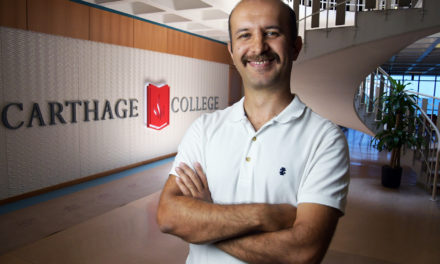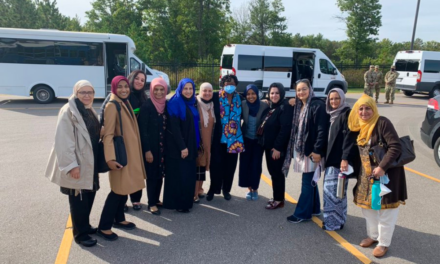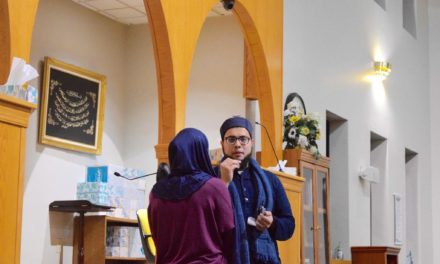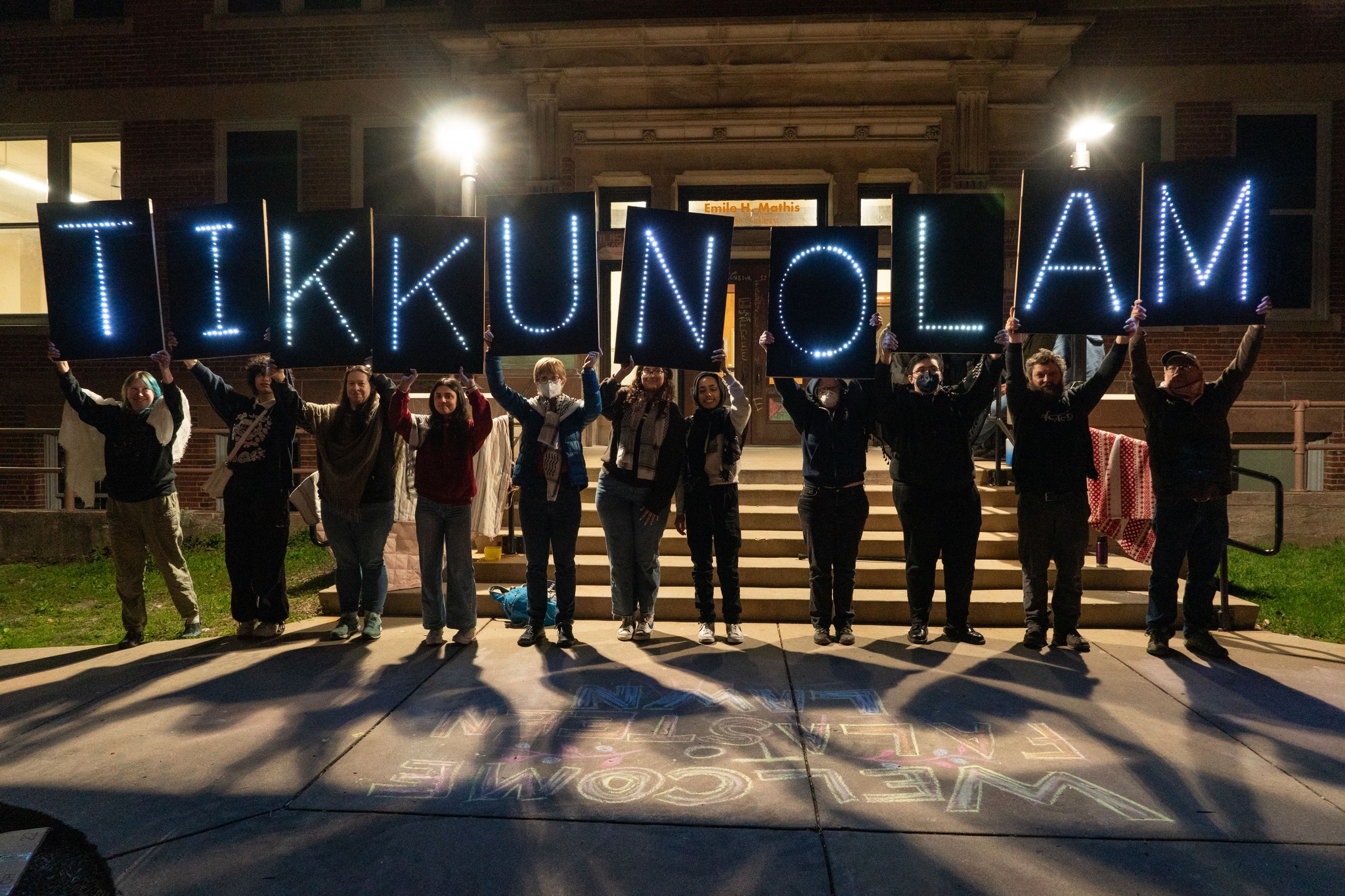
Photo by Joe Brusky
Chavurat Tziporah and Jewish Voice for Peace – Milwaukee hosted Shabbat Shirah May 4 at the UW-Milwaukee Popular University for Palestine encampment. Students hold up letters spelling Tikkun olam, Hebrew for “repairing the world.”
Jewish professors and students at the University of Wisconsin-Milwaukee protest encampment defended the encampment against accusations that it threatens Jewish safety. They also spoke out against equating anti-Zionism and antisemitism.
Participants in the UWM encampment point out that Jews and Christians have surrounded Muslims to protect them as they prayed, and Jews celebrated Shabbat (sabbath service) in the encampment, sharing challah (bread) with all.
The encampment at UWM, set up April 29, is one of dozens at colleges around the country to protest Israel’s ongoing war in Gaza. Students demand their universities disclose and end investments that involve Israel and call for an immediate ceasefire in Gaza.
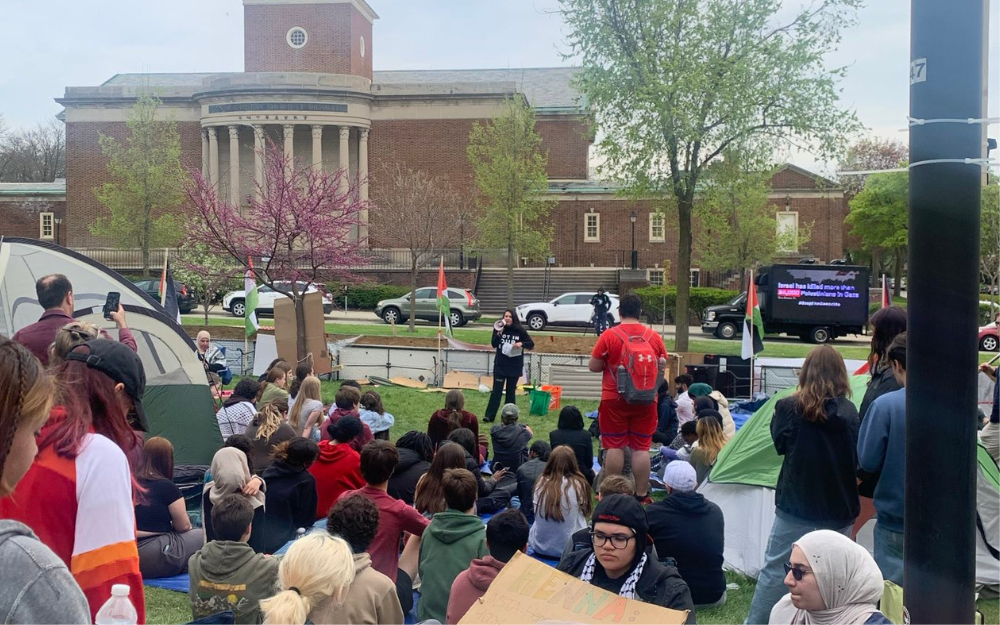
Photo courtesy of Milwaukee Alliance Against Racism and Political Repression
Jodi Melamed, Ph.D., a professor of English and Race, Ethnic and Indigenous Studies at Marquette University, led a teach-in at the UWM encampment that explained distinctions between antisemitism and anti-Zionism.
At the same time, U.S. lawmakers were moving to put an expanded definition of antisemitism into the 1964 Civil Rights Act. It broadens the legal definition of antisemitism to include “targeting of the state of Israel, conceived as a Jewish collectivity,” potentially criminalizing criticism of the State of Israel.
The U.S. House of Representatives passed the Antisemitism Awareness Act on May 1. To become law, the Senate must also pass it. Critics say it would stifle academic freedom and free speech on college campuses.
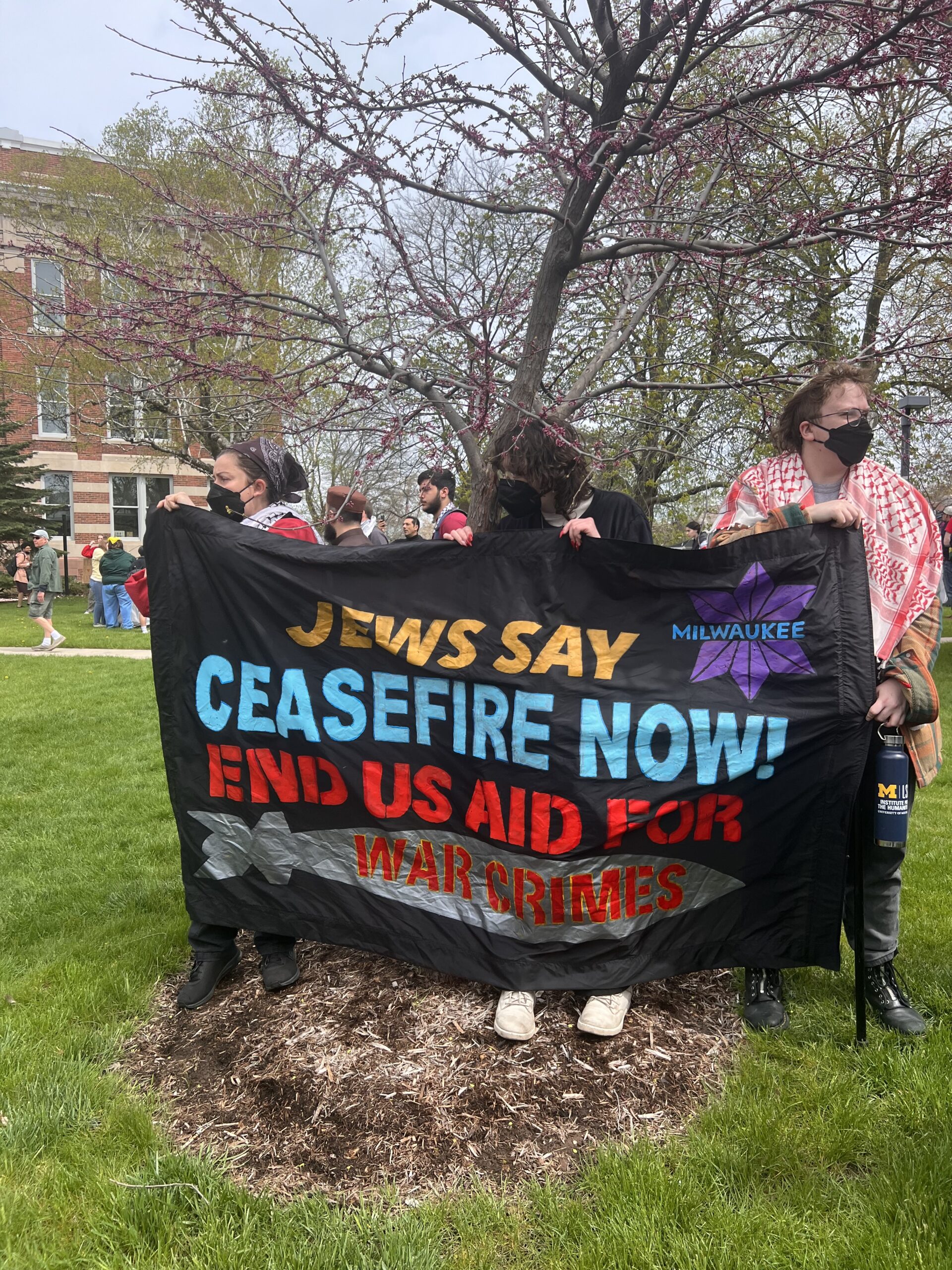
Photo by Mouna Rashid
“I do not understand why Jewish people think limiting academic freedom and speech protects Jews,” said UWM history professor Rachel Buff, Ph.D., yesterday in an interview with the Wisconsin Muslim Journal. Buff, who attends the encampment at UWM “whenever possible,” is a co-founder of Jewish Voice for Peace-Milwaukee and describes herself as an observant Jew.
“Nothing about this bill protects Jews. It is about repression. It allows the surveillance of students and faculty. Having discussions about critical topics is our business model. I am concerned as a Jew and as a faculty member.”
At a press conference yesterday and a teach-in last week, Jewish students and professors said that conflating anti-Zionism and antisemitism is dangerous to academic freedom on campus and Americans’ right to free speech.
Jewish students call out “specious allegations”
“There have been many attempts from this administration and the communities on campus to try and paint this encampment as antisemitic and unsafe to Jewish students,” said UWM undergraduate Terra Eden after a press conference held at the encampment yesterday. “I must tell you this encampment has been the most welcoming, loving space I’ve been a part of in my whole four years at UW-Milwaukee.
“In recent years, I felt uncomfortable expressing my solidarity with Palestine within my own synagogue community. But this encampment has been the one place that has made me feel wholly and entirely welcome as a Jew.”
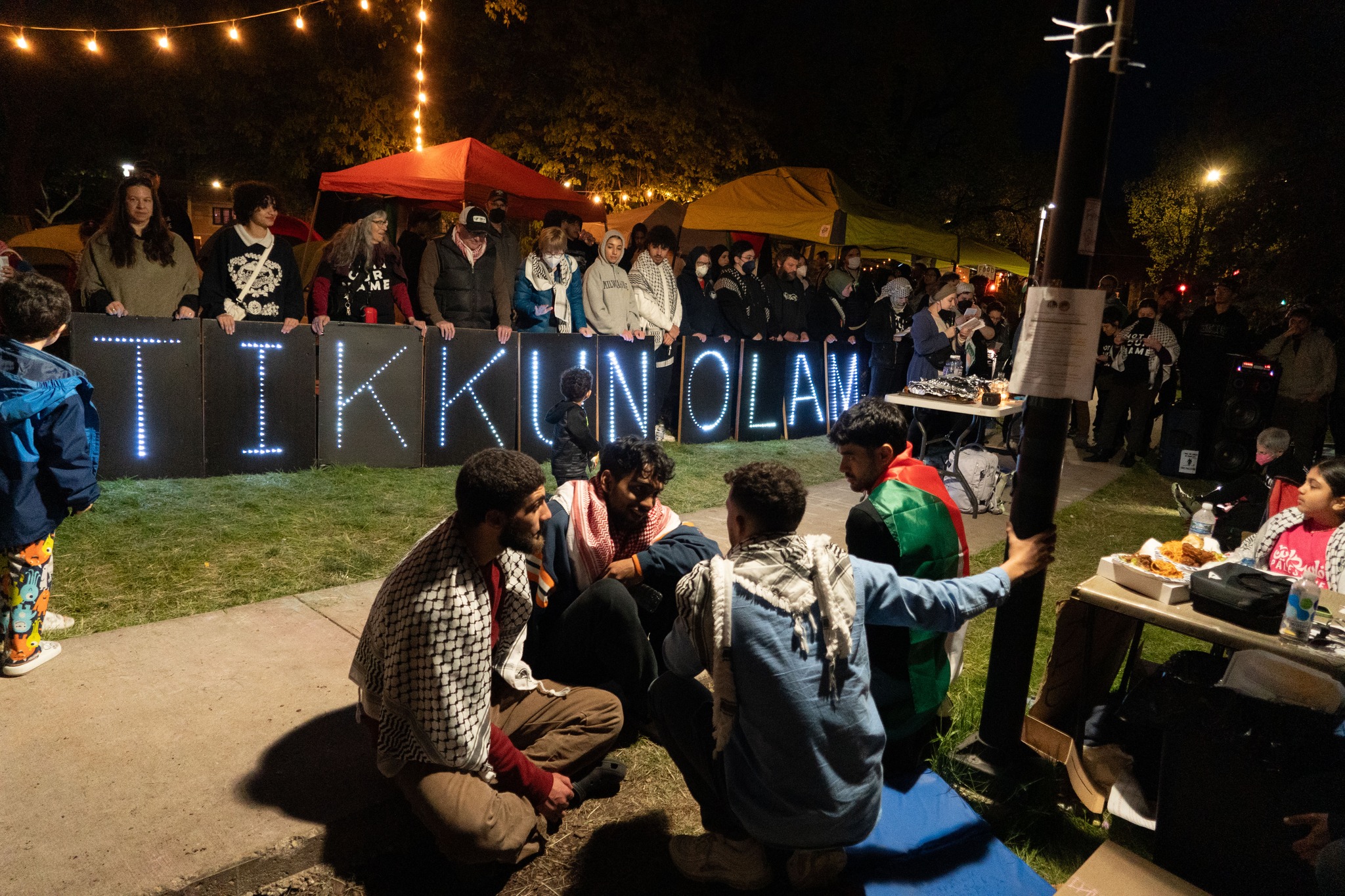
Photo by Joe Brusky
UWM graduate student Jess Annabelle called the allegations that the encampment is antisemitic “specious,” saying, “I am not being bullied here in the midst of hundreds of people supporting the call for a ceasefire and a liberated Palestine. I am entirely safe right now.
“I am one of many thousands of Jewish people supporting this call for peace, a ceasefire and an immediate and total liberation for all Palestinians. I’m also a Jewish community leader in the broader Milwaukee community. I’m here today to speak in strong and absolute support of the encampments here and around the country.
“In the 1930s and 1940s in Nazi Germany, my family was displaced from our home,” she continued. “We were starved in concentration camps, and three of my great aunts were murdered in Auschwitz.
“Today we are watching families in Gaza being displaced, starved and murdered by the tens of thousands. Stopping the Jewish holocaust sooner would’ve saved millions of lives. That is our work today—to end Israel’s genocide of Palestinians in Gaza as urgently as possible.
“As Jewish people, our faith teaches us that saving a single life is more important than every other Jewish law. Students at every encampment are demanding that we all do more to save the lives of our cousins,” she said to cheers from fellow protesters.
“As a Jewish person, I could not be more proud of the encampment movement and all other efforts of Jews, Palestinians and all people worldwide to call for an immediate and permanent peace with equal rights for all,” she said.
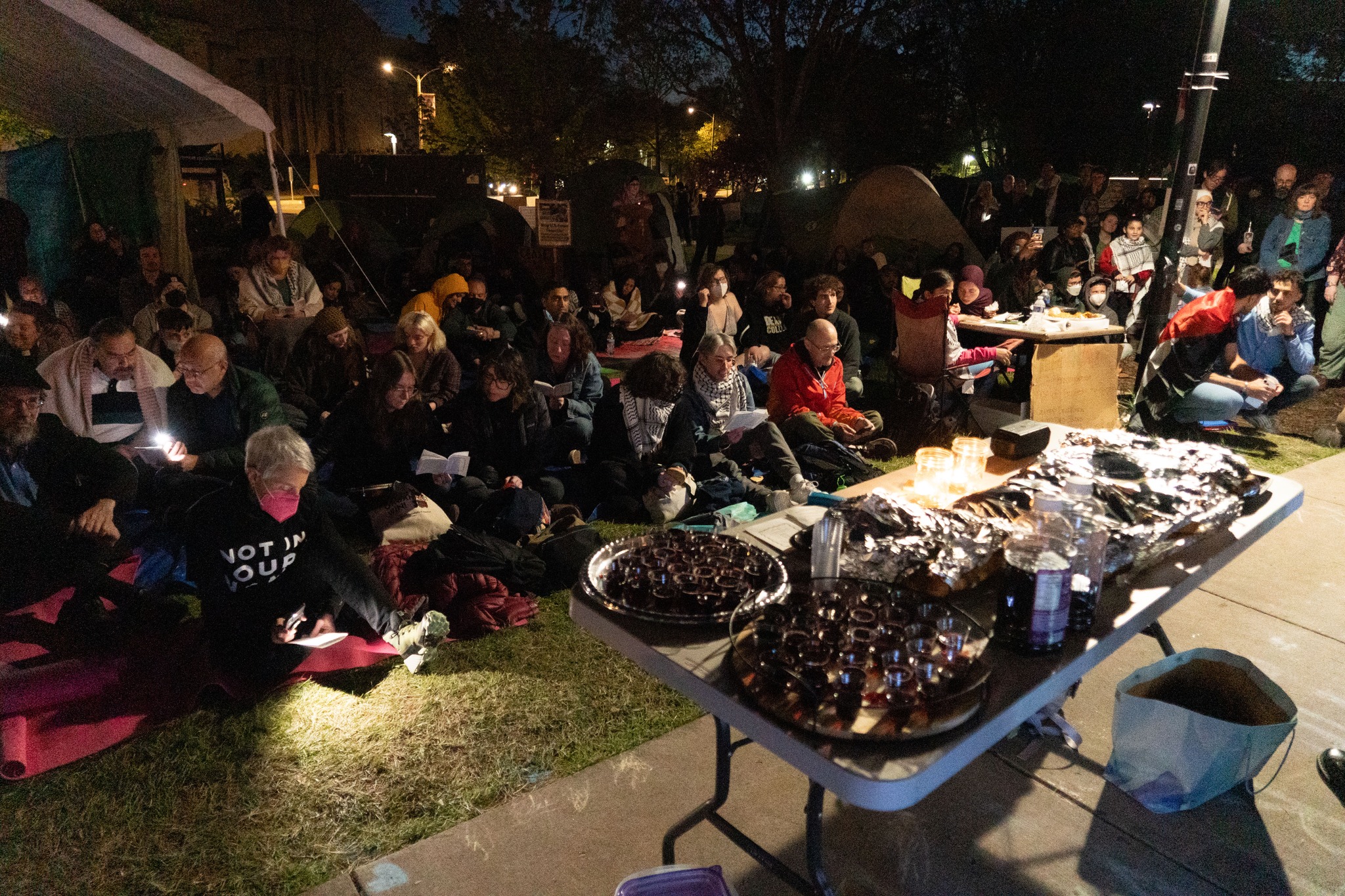
Photo by Joe Brusky
Undergraduate Terra Eden described herself as “an active member in my synagogue.” She said she wanted “to express my greatest support and love for the UWM encampment.”
“Our Jewish faith teaches us to uphold life above all and to love my neighbor as myself,” she explained. “ The Torah warns 36 times, and some say 46 times, not to oppress the stranger.
“We cannot love God if we do not love our neighbor. We cannot love God if we do not love the people of Palestine.
“Those who consider this encampment antisemitic have not been here,” she declared. “They have not witnessed nor experienced this community and its solidarity with the people of Gaza.
“Anti-Zionism is not anti-Semitic. Condemning Israel is not anti-Semitic. Loving your neighbor, holding life above all, being anti-genocide, pro-liberation and supporting a free Palestine from the river to the sea are Jewish values. As Jews and people of the shared world, we say, ‘Never again! Never again for Palestinians. Never again for the people of Gaza. Never again for anyone.”
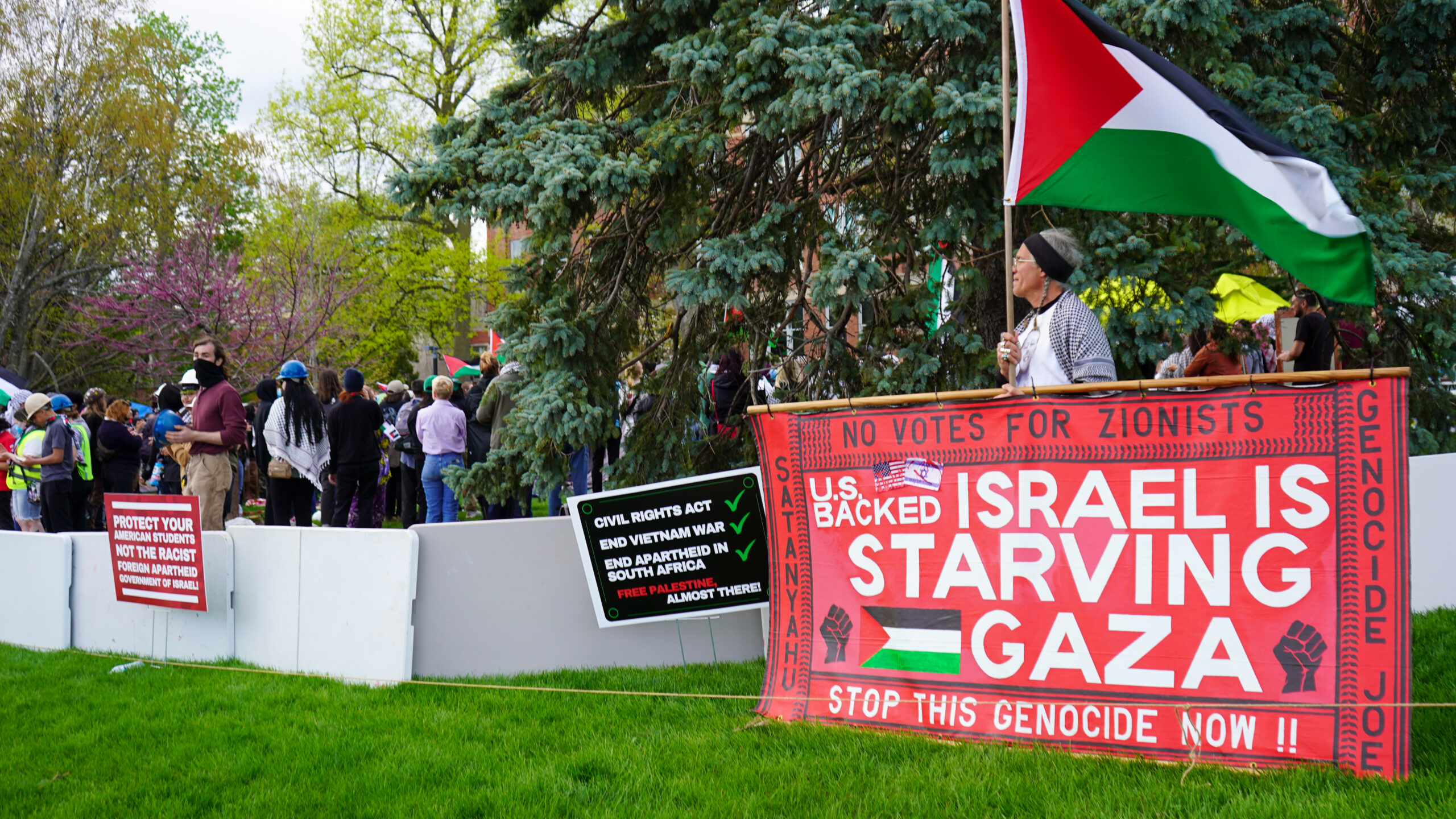
Photo by Kamal Moon
Jewish professor leads teach-in on Antisemitism Awareness Act
Student organizers at the UWM encampment asked Marquette Professor Jodi Melamed, a member of Jewish Voice for Peace, to lead a teach-in on the difference between antisemitism and anti-Zionism. Before her talk, the U.S. House of Representatives passed the Antisemitism Awareness Act, a bill she considers dangerous, she told WMJ. Her teach-in became an opportunity to explain it, she said.
Here are highlights from her teach-in earlier this week and comments with WMJ:
The House of Representatives recently passed the Antisemitism Awareness Act, a bill steeped in anti-Palestinian and anti-Arab racism that dangerously conflates concern for Palestinian human rights with danger and hate. It broadens the definition of antisemitism in order to include—and this is straight from the bill—”the targeting of the state of Israel conceived as a Jewish collectivity.” This is a new thing. It’s a weaponizing of the International Holocaust Remembrance Alliance’s definition of antisemitism.
Its goal is to add that definition to the Civil Rights Act of 1964 in order to further criminalize pro-Palestinian speech and, this is the kicker, to make federal funding for universities dependent on accepting this false definition, pretending criticism of Israel is discrimination against Jews.
I don’t know about you, but when you have to pass a law to say this word must mean this, you are living in authoritarian times. This legislating of meaning is anti-intellectual and assaults universities at the level of their core function, at the level of making meaning. This act also weaponizes antisemitism in a way that puts Jews in danger because it distracts from real acts of antisemitism.
This is an attempt to change antidiscrimination law to try to repress the student movements sweeping U.S. campuses that demand an end to the genocide in Gaza and divestment from Israel’s state violence.
There was a time not too long ago when mainstream Jewish institutions like the Anti-Defamation League thought that they could exert power and keep all pro-Palestinian expression off of U.S. campuses. They wanted to censor not only critiques of Israeli state violence but even the word “Palestinian.” They wanted to make that a dangerous word on U.S. campuses. But thanks to the principled and brave, heroic student movement for Gaza, that ship has sailed.
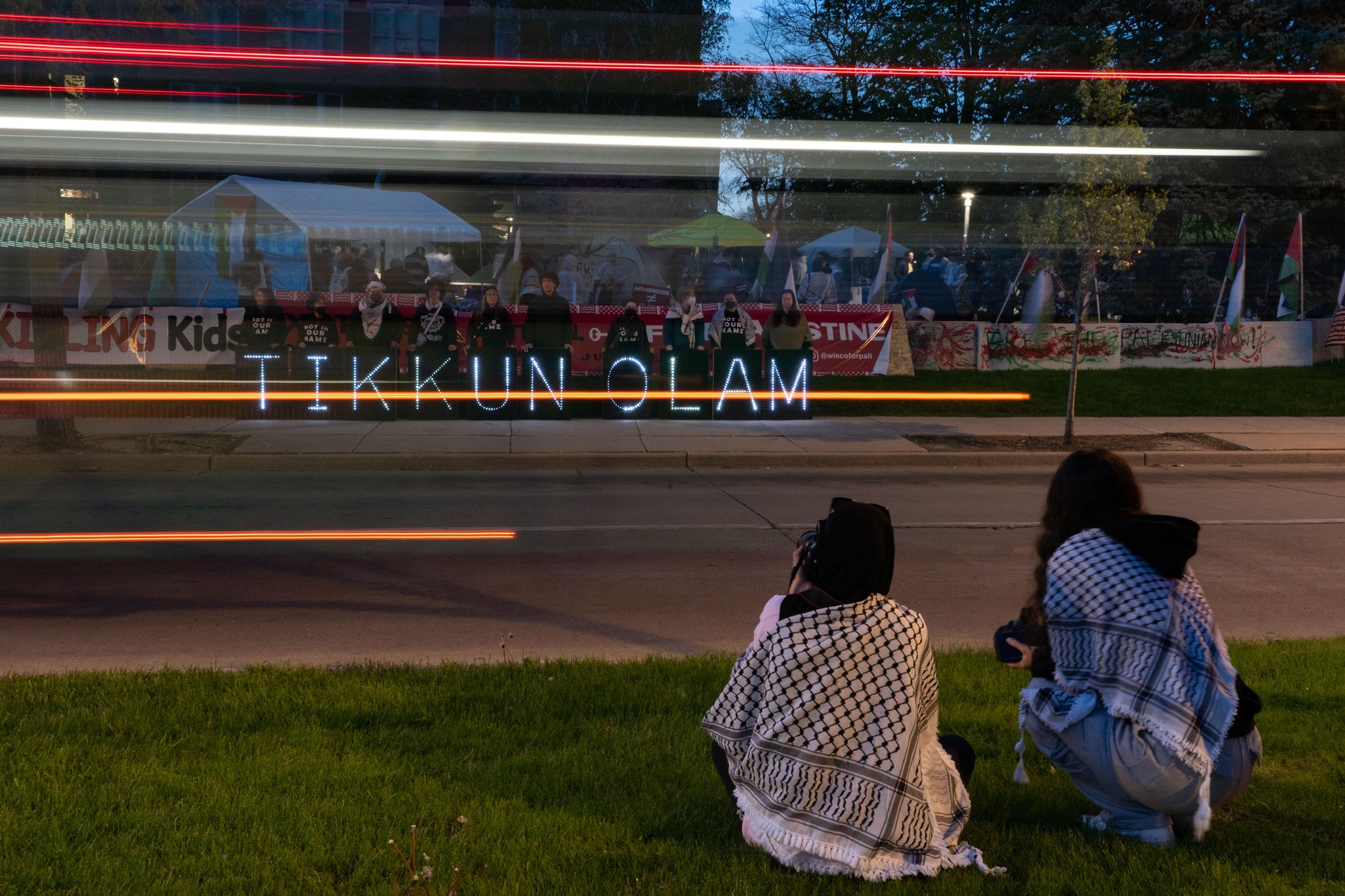
Photo by Joe Brusky
In an interview afterward with WMJ, Melamed said about 100 Shorewood High School students who had walked out of school in support of Palestinians in Gaza listened to her teach-in.
“There were two Jewish high school students who were questioning indoctrinated Zionism,” she said. “They came up to me and expressed their excitement, hopes and fears as young Jews in the movement.”
